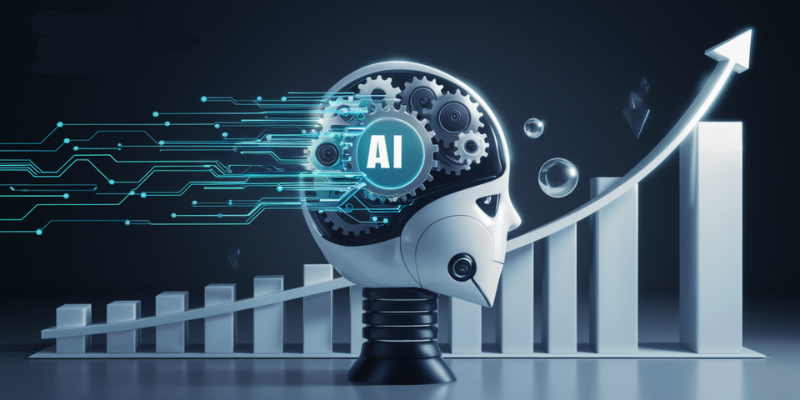
The future idea of artificial intelligence (AI) is no longer limited to science fiction and industry companies. Today, it’s transforming how businesses operate, strategize, and grow. From automating mundane tasks to predicting consumer behavior, AI is enabling companies across industries to boost operational efficiency and make smarter decisions. But one of the most compelling reasons businesses are adopting AI is its potential to reduce costs and increase profits simultaneously. With rising market competition and shrinking profit margins, leveraging AI effectively has become a strategic necessity for sustainable growth.
Streamlining Operations to Reduce Overheads
Automating labor-intensive and repetitive operations is one of the main ways artificial intelligence lowers expenses. Whether it’s data entry, customer support through chatbots, or inventory management, AI-powered automation eliminates the need for large manual workforces and significantly cuts down labor costs. Companies that previously required dozens of employees to manage basic operations are now doing the same with a few automated systems and a lean team.
AI also minimizes human error, leading to fewer costly mistakes. AI-powered quality control systems, for instance, are able to detect flaws in production more quickly and precisely than human inspectors. This results in lower manufacturing costs, better product uniformity, and less waste. Learning how to build and implement such systems is a core focus of the Artificial Intelligence Course in Dindigul, which equips professionals with real-world AI application skills.
Smarter Decision-Making with Predictive Analytics
Artificial intelligence (AI) is excellent at rapidly evaluating vast amounts of data and spotting hidden patterns. Predictive analytics forecasts future patterns, such as consumer demand, market fluctuations, or possible equipment problems, using previous data. These insights enable businesses to make well-informed choices, cut down on wasteful spending, and grab lucrative possibilities before rivals do.
Retailers, for instance, use AI to optimize their inventory.By forecasting which goods would sell better during a specific time of year or area, they avoid overstocking or understocking, both of which can be costly. In finance, AI helps in fraud detection, risk assessment, and algorithmic trading, leading to better financial outcomes and fewer losses.
Companies in fast-growing tech hubs often invest in upskilling their staff through programs like the Artificial Intelligence Course in Tirunelveli, ensuring they can interpret AI-driven insights effectively for better strategic planning.
Enhancing Customer Experience to Drive Revenue
AI is revolutionizing customer service through intelligent chatbots, recommendation systems, and personalized marketing. AI is able to provide highly customized product suggestions, information, and promotions by analyzing consumer behavior in real time. This enhances the customer journey, increases engagement, and boosts sales conversion rates.
For example, machine learning algorithms are used by e-commerce sites to propose products based on customer browsing and purchase history. These hyper-targeted suggestions result in higher average order values and customer satisfaction.
AI chatbots in customer care answer questions around-the-clock, eliminating the need for sizable support staff while guaranteeing prompt, reliable replies. These bots can handle thousands of conversations simultaneously, allowing businesses to serve more customers at a fraction of the cost.
To master such technologies, many professionals are enrolling in training like the AI Courses in Gurgaon, which provide hands-on experience with AI tools that directly impact customer engagement strategies.
Cost Optimization in Supply Chain and Logistics
AI applications in logistics and supply chain management are achieving unprecedented levels of efficiency. By optimizing delivery routes, predicting shipment delays, and managing warehouse operations, AI helps in significantly cutting costs related to transportation, fuel, and storage.
AI-powered route optimization tools, for instance, take into account traffic patterns, weather conditions, and delivery windows to propose the most cost-effective delivery plans. In warehousing, AI robots and IoT devices work together to streamline storage, reduce retrieval times, and eliminate human error.
Moreover, AI assists in demand forecasting, helping companies produce the right amount of goods at the right time, reducing overproduction and minimizing storage costs. With the growing influence of AI and social media, businesses can also anticipate trends more accurately by analyzing consumer behavior and sentiment online.
Improving Product Development and Innovation
AI plays a vital role in accelerating product development by analyzing market data, customer feedback, and competitor products to uncover gaps and opportunities. Companies can simulate prototypes and test ideas using AI modeling before investing heavily in production. This reduces research and development costs while increasing the chances of product success.
AI can even monitor and evaluate customer responses to newly launched products using natural language processing and sentiment analysis, helping businesses fine-tune offerings quickly and efficiently.
Organizations fostering innovation often pair AI with skilled talent, with many turning to institutions offering the Artificial Intelligence Course in Kanchipuram to find or develop their next generation of tech leaders.
AI is more than just a trend—it’s a transformational tool for cost reduction and profit enhancement. Supply chain optimization, customer experience enhancement, and operational simplification and enabling smarter decision-making, AI delivers measurable value to businesses willing to adopt and adapt.
Also Check: What are the applications of Artificial Intelligence?
